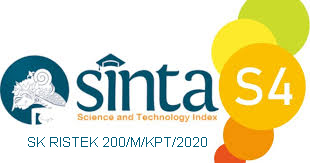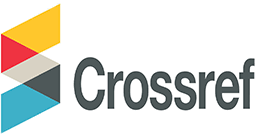Sentiment Analysis of 2024 Presidential Candidates Election Using SVM Algorithm
Abstract
Keywords
Full Text:
PDFReferences
BPS, “Hasil Perhitungan Suara Sah Pemilu Presiden dan Wakil Presiden Menurut Provinsi Tahun 2004 , 2009 , 2014, 2019.” https://www.bps.go.id/statictable/2009/03/04/1574/hasil-perhitungan-suara-sah-pemilu-presiden-dan-wakil-presiden-menurut-provinsi-tahun-2004-2009-2014-2019.html (accessed Jul. 25, 2023).
B. W. Sari and F. F. Haranto, “IMPLEMENTASI SUPPORT VECTOR MACHINE UNTUK ANALISIS SENTIMEN PENGGUNA TWITTER TERHADAP PELAYANAN TELKOM DAN BIZNET,” Jurnal Pilar Nusa Mandiri, vol. 15, no. 2, pp. 171–176, Sep. 2019, doi: 10.33480/pilar.v15i2.699.
Fatihah Rahmadayana and Yuliant Sibaroni, “Sentiment Analysis of Work from Home Activity using SVM with Randomized Search Optimization,” Jurnal RESTI (Rekayasa Sistem dan Teknologi Informasi), vol. 5, no. 5, pp. 936–942, Oct. 2021, doi: 10.29207/resti.v5i5.3457.
S. Fendyputra Pratama, R. Andrean, and A. Nugroho, “Analisis Sentimen Twitter Debat Calon Presiden Indonesia Menggunakan Metode Fined-Grained Sentiment Analysis,” JOINTECS (Journal of Information Technology and Computer Science), vol. 4, no. 2, pp. 2541–3619, 2019, doi: 10.31328/jo.
D. W. Seno and A. Wibowo, “Analisis Sentimen Data Twitter Tentang Pasangan Capres-Cawapres Pemilu 2019 Dengan Metode Lexicon Based Dan Support Vector Machine,” Jurnal Ilmiah FIFO, vol. 11, no. 2, p. 144, Nov. 2019, doi: 10.22441/fifo.2019.v11i2.004.
D. Darwis, E. Shintya Pratiwi, A. Ferico, and O. Pasaribu, “PENERAPAN ALGORITMA SVM UNTUK ANALISIS SENTIMEN PADA DATA TWITTER KOMISI PEMBERANTASAN KORUPSI REPUBLIK INDONESIA,” 2020.
A. S. Arief, “SENTIMENTANALYSIS REVIEW APLIKASI MENGGUNAKAN ALGORITMA SVM PADA APLIKASI MYPERTAMINA,” 2023.
S. Diantika, W. Gata, H. Nalatissifa, and M. Lase, “Komparasi Algoritma SVM Dan Naive Bayes Untuk Klasifikasi Kestabilan Jaringan Listrik,” JURNAL ILMIAH ELEKTRONIKA DAN KOMPUTER, vol. 14, no. 1, pp. 10–15, 2021.
R. Risnantoyo, A. Nugroho, and K. Mandara, “Sentiment Analysis on Corona Virus Pandemic Using Machine Learning Algorithm,” JOURNAL OF INFORMATICS AND TELECOMMUNICATION ENGINEERING, vol. 4, no. 1, pp. 86–96, Jul. 2020, doi: 10.31289/jite.v4i1.3798.
D. B. Rarasati and J. C. A. Putra, “Correlation Between Twitter Sentiment Analysis with Three Kernels Using Algorithm Support Vector Machine (SVM) Governor Candidate Electability Level,” COIESE, pp. 249–256, 2021.
F. Rahutomo, P. Y. Saputra, and M. A. Fidyawan, “IMPLEMENTASI TWITTER SENTIMENT ANALYSIS UNTUK REVIEW FILM MENGGUNAKAN ALGORITMA SUPPORT VECTOR MACHINE,” Jurnal Informatika Polinema, vol. 4, no. 2, pp. 93–100, 2018.
A. Hutapea and M. Tanzil Furqon, “Penerapan Algoritme Modified K-Nearest Neighbour Pada Pengklasifikasian Penyakit Kejiwaan Skizofrenia,” Jurnal Pengembangan Teknologi Informasi dan Ilmu Komputer, vol. 2, no. 10, pp. 3957–3961, 2018, [Online]. Available: http://j-ptiik.ub.ac.id
F. Istighfarizkya, N. A. S. ER, I. M. Widiarthaa, L. G. Astutia, I. G. N. A. C. Putra, and I. K. G. Suhartana, “Klasifikasi Jurnal menggunakan Metode KNN dengan Mengimplementasikan Perbandingan Seleksi Fitur,” Jurnal Elektronik Ilmu Komputer Udayana, vol. 11, pp. 167–176, 2022, [Online]. Available: https://scholar.google.com
F. Satria, Zamhariri, and M. A. Syaripudin, “Prediksi Ketepatan Waktu Lulus Mahasiswa Menggunakan Algoritma C4.5 Pada Fakultas Dakwah Dan Ilmu Komunikasi UIN Raden Intan Lampung,” Jurnal Ilmiah MATRIK, vol. 22, pp. 28–35, 2020.
O. H. Anidjar, A. Barak, B. Ben-Moshe, E. Hagai, and S. Tuvyahu, “A Stethoscope for Drones: Transformers Based Methods for UAVs Acoustic Anomaly Detection,” IEEE Access, 2023, doi: 10.1109/ACCESS.2023.3262702.
DOI: https://doi.org/10.31326/jisa.v6i2.1714
Refbacks
Copyright (c) 2023 Michael Alfonso, Dionisia Bhisetya Rarasati

This work is licensed under a Creative Commons Attribution-ShareAlike 4.0 International License.
JOURNAL IDENTITY
Journal Name: JISA (Jurnal Informatika dan Sains)
e-ISSN: 2614-8404, p-ISSN: 2776-3234
Publisher: Program Studi Teknik Informatika Universitas Trilogi
Publication Schedule: June and December
Language: Indonesia & English
APC: The Journal Charges Fees for Publishing
Indexing: EBSCO , DOAJ, Google Scholar, Arsip Relawan Jurnal Indonesia, Directory of Research Journals Indexing, Index Copernicus International, PKP Index, Science and Technology Index (SINTA, S4) , Garuda Index
OAI address: http://trilogi.ac.id/journal/ks/index.php/JISA/oai
Contact: jisa@trilogi.ac.id
Sponsored by: DOI – Digital Object Identifier Crossref, Universitas Trilogi
In Collaboration With: Indonesian Artificial Intelligent Ecosystem(IAIE), Relawan Jurnal Indonesia, Jurnal Teknologi dan Sistem Komputer (JTSiskom)
JISA (Jurnal Informatika dan Sains) is Published by Program Studi Teknik Informatika, Universitas Trilogi under Creative Commons Attribution-ShareAlike 4.0 International License.


















